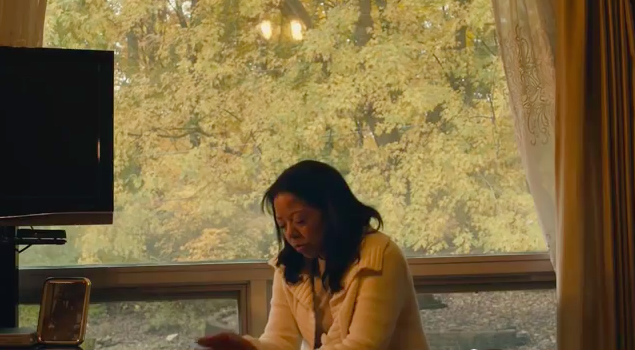MOVIE REVIEWS |
INTERVIEWS |
YOUTUBE |
NEWS
|
EDITORIALS | EVENTS |
AUDIO |
ESSAYS |
ARCHIVES |
CONTACT
|
PHOTOS |
COMING SOON|
EXAMINER.COM FILM ARTICLES
||HOME


Thursday, August 20, 2015
MOVIE REVIEW
3 1/2 Minutes, Ten Bullets
A Life Treasured, Cherished...And Destroyed In Seconds

Lucia
McBath, the mother of Jordan Russell Davis, who was murdered on November 23,
2012, in a moment from Marc Silver's documentary "3 1/2 Minutes, Ten Bullets".
Participant Media
by
Omar P.L. Moore/PopcornReel.com
 FOLLOW
FOLLOW
Thursday,
August 20,
2015
Lucid, clear-eyed and matter-of-fact, Marc Silver’s documentary “3 1/2 Minutes,
Ten Bullets” chronicles the pain and heartbreak of Lucia McBath and Ron Davis
with stunning ease, through courtroom footage and entirely first-person
narrative. It’s effective, personal and devastating as it is evenhanded in its
treatment of all sides affected by the fateful event of Friday, November 23,
2012, when Ms. McBath’s and Mr. Davis’s son Jordan was killed.
Jordan Davis was assassinated at a gas station by Michael Dunn, a white man, in
Jacksonville, Florida. Dunn had time to drink champagne and eat pizza at a hotel
miles and miles away with his girlfriend after shooting Mr. Davis. He
never called the police. The killer claimed his life was in danger.
The mainstream U.S. media framed the resulting legal proceedings in 2014 as a
“loud music” trial, adopting the language and mentality of the killer in shaping
the story for the American public.
“3 1/2 Minutes”, the documentary’s original title, is a quiet, sobering
documentary with the architectural structure of language and artifact at its
front and center. Mr. Silver wisely cedes the platform to Ms. McBath, Mr.
Davis and Jordan’s friends to speak on Jordan’s behalf, to paint a picture of
his life. Home videos of Jordan Davis are especially touching, wondrous
and painful in light of Jordan’s abbreviated life.
The examination of guns and America’s gun culture is not incidental to “3 1/2
Minutes”, and I suspect that this penetrating documentary, which enveloped me
from start to finish, had the “Ten Bullets” added to the documentary’s title to
emphasize the gun crisis in America. The killer got easy access to the gun
that fired ten bullets into a car, three of which struck Mr. Davis.
Ms. McBath gains a new life as a gun control activist. She sets up
scholarships in her late son’s name. She travels around the country
stirring the conscience of an outraged and indifferent nation. America’s
great contradiction, among others, is the rural/urban divide on guns and gun
culture. It is one of several effective and unspoken moments of the film.
Also unspoken but obvious to “3 1/2 Minutes, Ten Bullets” is the racist climate
of the killer and the institutions (the courtroom and predominantly white
jurors) he sought the safe haven of. Mr. Silver relies on the killer’s own
damning words, his lack of remorse and racist beliefs, statements and adamant
conviction he did the right thing and somehow did the world a favor by killing
an unarmed 17-year-old boy. The jury in February 2014 deadlocked on the
first-degree murder charge for the killer, and only a subsequent September 2014
retrial resulted in a guilty verdict the following month, on top of a life
sentence the killer was already serving.
The mood and feel of “3 1/2 Minutes”, or more accurately the events it depicts,
spiked me with feelings of profound anger and sad reflection. Jordan Davis
should still be alive today, living his life and pursuing his dreams. His
family and friends should be enjoying the pleasure of his company, the insights
and joys he would have brought them, the discoveries and pride he would have
inspired. Mr. Davis’s untimely loss and presence reverberates throughout
“3 1/2 Minutes, Ten Bullets”. And it hurts deeply.
The escalation of violence in the American fabric is another unspoken but clear
variable of Mr. Silver’s film. Impatience — especially for some white men — and
a lack of conflict resolution and anger management usually results in
disproportionate amounts of white men ending a life, not ending a dispute.
One need only refer to high-profile killings by white men (many of whom are
police) of unarmed Black men and women in America in the 32 months since the
killing of Jordan Davis. Ray Tensing, Timothy Loehmann, Ted Wafer, Michael
Slager, Dylann Roof, Dan Pantaleo, Darren Wilson are among just a few to note
this truism of white-on-Black violence, which didn’t happen overnight in
America. (Last
night in St. Louis, Mansur Ball-Bey, 18, was killed by police under apparently
questionable circumstances.)
Too often Black families are left picking up the pieces after white violence,
police violence and Black violence ravages their familial structure. “3
1/2 Minutes” shows us one of those families in that shattering, barren
aftermath, bravely opening up to express their most intimate feelings, thoughts,
joys and agonies to us.
“3 1/2 Minutes, Ten Bullets” is not rated by the Motion Picture Association Of America.
The film's running time is one hour and 25 minutes.
COPYRIGHT 2015. POPCORNREEL.COM. ALL RIGHTS RESERVED.  FOLLOW
FOLLOW
MOVIE REVIEWS |
INTERVIEWS |
YOUTUBE |
NEWS
|
EDITORIALS | EVENTS |
AUDIO |
ESSAYS |
ARCHIVES |
CONTACT
| PHOTOS |
COMING SOON|
EXAMINER.COM FILM ARTICLES
||HOME


 FOLLOW
TWEET
FOLLOW
TWEET FOLLOW
FOLLOW